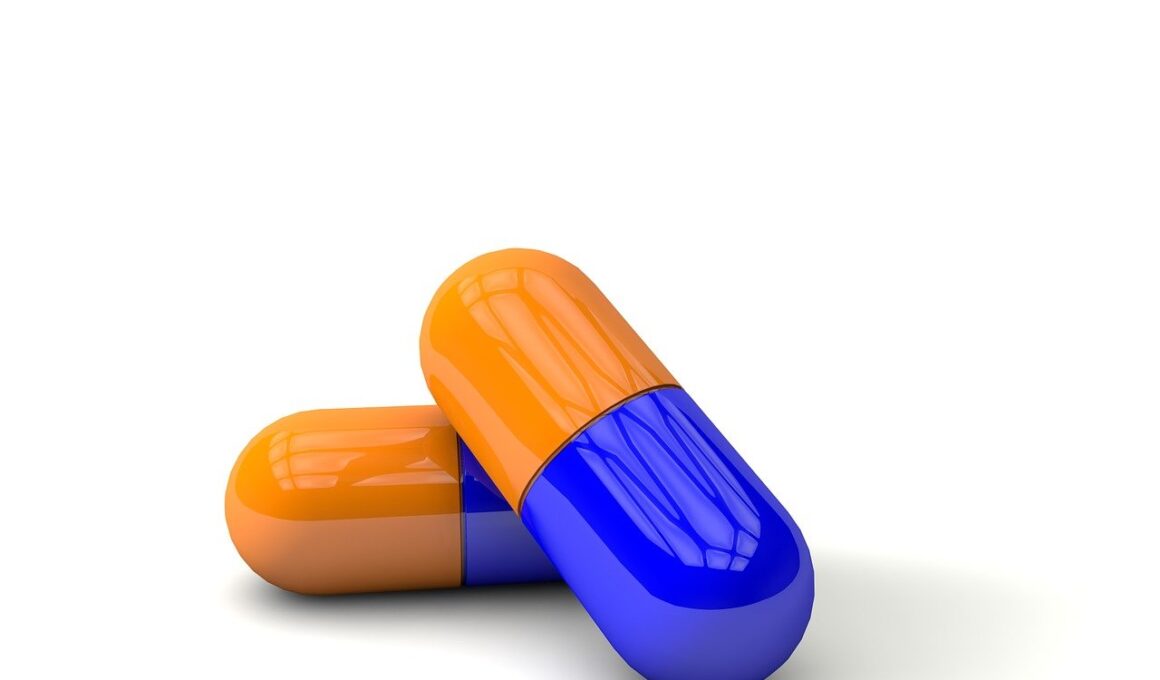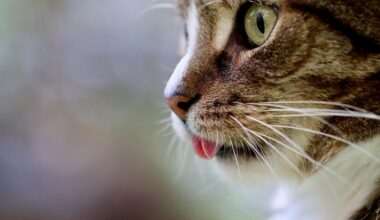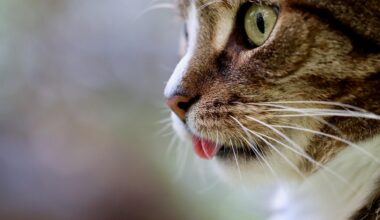Role of Nutrition and Immune Support in Cats with Heartworm Disease
Cats suffering from heartworm disease face several health challenges due to the presence of worms in their vascular system. These parasitic organisms can lead to severe respiratory issues, increased heart workload, and general lethargy. Therefore, support through nutrition becomes vital in enhancing their overall health and immune response. A balanced diet rich in essential nutrients can help bolster a cat’s defenses against this potentially fatal disease. Nutritional choices should focus on high-quality proteins and fats that can aid in maintaining energy levels and overall physiological well-being. Antioxidants such as vitamins C and E might also play a crucial role in reducing inflammation and oxidative stress caused by heartworm infestations. Consulting a veterinarian for a tailored diet plan is paramount, as they can suggest specific dietary changes that target a cat’s individual needs. Additionally, given the potential for compromised immune function in heartworm-affected cats, incorporating immune support supplements may also be advisable. Ingredients like omega-3 fatty acids can further enhance the immune response in these suffering felines, thus promoting better health outcomes.
Understanding the specific nutritional requirements for cats diagnosed with heartworm disease is essential for their recovery and long-term health. Nutrition not only provides necessary energy but also directly influences the body’s ability to combat infections and diseases. Diets should include adequate levels of high-quality protein to ensure tissue repair and maintenance, given that heartworm can cause significant damage to a cat’s body. Additionally, micronutrients play a substantial role. For example, zinc is critical for immune function and can greatly aid in the recovery process. Foods containing taurine, an amino acid unique to animal protein, are also essential, as they promote heart and overall feline health. Aside from fortified commercial diets, it may be helpful to prepare home-cooked meals tailored to diabetic constraints and specific dietary needs. Many cats are selective eaters, so introducing new foods needs patient acclimation. An innovative approach may include incorporating flavors or textures that appeal to cats, making the new dietary interventions more appealing and thus ensuring compliance. Regular monitoring of the cat’s health and dietary intake should help ensure that they receive the necessary nutrients for optimal recovery.
Importance of Hydration
Hydration is another crucial component in the management of heartworm disease in cats. Proper hydration supports kidney function and can assist in flushing out the toxins and waste products that accumulate due to the stress of the parasite burden. Ensuring that a cat has access to fresh, clean water at all times is non-negotiable. It can be helpful to provide a variety of hydration options, such as fresh water, wet food, or even homemade broth, to encourage fluid intake. Cats may be more prone to urinary problems when under stress or with illness, and a higher water consumption is linked to better health. Dehydrated cats may also exhibit a decreased appetite, further complicating their recovery journey. Integrating moisture-rich foods can help maintain hydration levels and reduce the risk of UTI complications. Additionally, monitoring your cat’s hydration levels can be vital. Look for signs of dehydration such as dry gums, lethargy, and reduced skin elasticity. If any signs are present, a veterinarian should be consulted to address any fluid concerns and explore possible treatment options to support recovery.
While nutrition and hydration are critical, other lifestyle factors also significantly impact a cat’s recovery from heartworm disease. Regular, gentle exercise can enhance circulation and promote overall cardiovascular health, which is especially important for a cat whose heart is under strain from infections. Engaging your cat in light playtime can stimulate activity without overexerting them, promoting a sense of normalcy. Providing a stress-free environment at home is also essential; loud noises, overcrowded spaces, or interaction with aggressive pets can add additional stress, which can impair the immune system further. Dedicated spaces for rest along with areas for quiet may greatly enhance your feline’s comfort during their healing process. Monitoring any behavioral changes such as increased hiding or aggression can help pet owners understand their emotional state better. When cats feel more secure, they may exhibit improved appetite and willingness to engage with their environment. Veterinary visits should be scheduled regularly to evaluate ongoing treatment plans and response to therapies. A combination of good nutrition and healthy lifestyle will help create a stronger foundation for their recovery and longevity.
Supplement Options
In addition to a proper diet and hydration, many cat owners consider various supplements to further support their feline friends battling heartworm disease. Supplements featuring omega-3 fatty acids can be beneficial in reducing inflammation and providing necessary joint support. They may also help improve skin health, which can be compromised during illness. Moreover, probiotics can contribute to gut health, especially if a cat has received antibiotics for secondary infections related to heartworm. A healthy gut flora can lead to better nutrient absorption, meaning higher benefits from the foods consumed. Herbal remedies, like milk thistle, may provide additional liver support, which is beneficial since the liver works harder when the body is under stress from parasitic infections. Before introducing any supplement, however, it’s critical to consult a veterinarian to ensure safety and efficacy tailored to your cat’s specific needs. Some supplements might interact negatively with other medications, and understanding optimal dosages is necessary to avoid potential side effects. A well-rounded approach encompassing diet, supplements, and lifestyle modifications creates an effective regime for managing heartworm disease in cats.
As heartworm disease evolves, so does our understanding of how nutrition and supportive care can influence outcomes. For cat owners, attention to detail regarding dietary offerings and lifestyle practices could mean the difference between a cat’s successful recovery or challenges ahead. Regular consultations with a veterinarian ensure that dietary adjustments and supplemental therapies remain suitable over time, addressing any side effects or changes in health status promptly. Remaining proactive about nutrition could help shield cats from further infections or complications linked to heartworm disease. The role of nutrition in therapy extends beyond just addressing the current health crisis; it is an investment in their long-term vitality and resilience. Educating oneself about proper feline nutritional needs ensures that cats receive the right proportions of nutrients at all life stages. Understanding that each cat is an individual with unique requirements paves the way for tailoring care that’s beneficial. This involvement fortifies the bond between pet and owner, creating a community of support towards optimal health and resisting diseases. With focused effort and ongoing education, cat owners can cultivate healthier futures for their beloved pets.
Conclusion
In conclusion, heartworm disease in cats requires a multifaceted approach that strongly integrates nutrition, hydration, lifestyle modifications, and supportive treatments. Providing your cat with a balanced diet enriching in essential nutrients, combined with adequate hydration, can substantially enhance their immune response and overall resilience against the disease. Ongoing support via supplements, regular vet check-ups, and creating a calm environment conducive to recovery is equally important. As pet owners, it is imperative to remain vigilant and informed about their health needs, making necessary adjustments as presented by their health progression. Understanding each cat’s unique needs and preferences may also promote better adherence to dietary changes. Remember that every small effort counts in supporting your feline friend through recovery. By fostering good health practices today, we increase the chances that they lead longer, healthier lives in the future. With compassion and dedication, pet owners can make a meaningful impact in the lives of their cats suffering from this debilitating disease, offering hope and resilience as they recover from heartworm disease.
In addition to a proper diet and hydration, many cat owners consider various supplements to further support their feline friends battling heartworm disease. Supplements featuring omega-3 fatty acids can be beneficial in reducing inflammation and providing necessary joint support. They may also help improve skin health, which can be compromised during illness. Moreover, probiotics can contribute to gut health, especially if a cat has received antibiotics for secondary infections related to heartworm. A healthy gut flora can lead to better nutrient absorption, meaning higher benefits from the foods consumed. Herbal remedies, like milk thistle, may provide additional liver support, which is beneficial since the liver works harder when the body is under stress from parasitic infections. Before introducing any supplement, however, it’s critical to consult a veterinarian to ensure safety and efficacy tailored to your cat’s specific needs. Some supplements might interact negatively with other medications, and understanding optimal dosages is necessary to avoid potential side effects. A well-rounded approach encompassing diet, supplements, and lifestyle modifications creates an effective regime for managing heartworm disease in cats.


